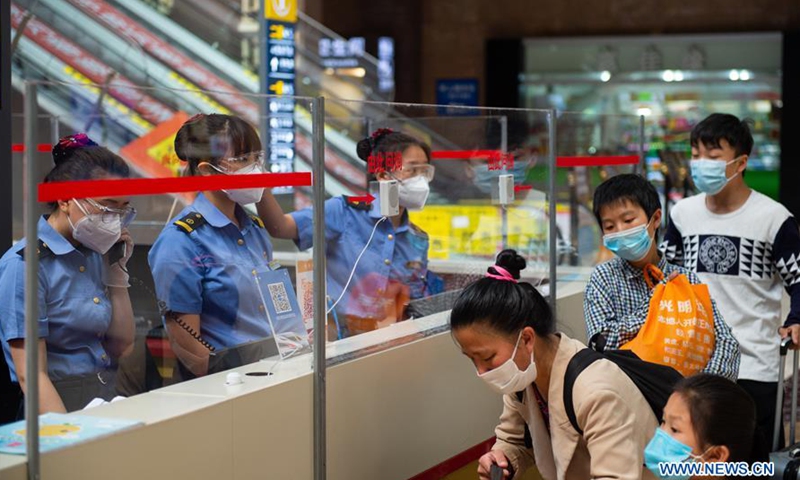Experts debate if Beijing outbreak is 'under control'
By Zhao Yusha and Zhang Hui Source:Global Times Published: 2020/6/19 20:28:40

Passengers are seen at Beijing Railway Station in Beijing, capital of China, June 18, 2020. Following the upgrade of emergency response to COVID-19 from Level III to Level II in Beijing, Beijing Railway Station has conducted strict measures to prevent and control the spread of the epidemic.Photo:Xinhua
Despite a mystery over Beijing's latest coronavirus outbreak and the possibility of a super spreader, Wu Zunyou, the chief epidemiologist of the Chinese Center for Disease Control and Prevention, said Thursday the capital's coronavirus outbreak has been brought under control.
The expert added at a press briefing that there may be new virus cases in the coming days, but they would likely be discovered during the testing process, not new transmissions.
Wu's statement has sparked discussions and also invited suspicions, as some questioned whether such a statement was "premature."
Beijing reported around 200 infections within a week, and all were linked to the Xinfadi market - a sign of a possible super spreader in the market, Yang Zhanqiu, the deputy director of the pathogen biology department at Wuhan University, told the Global Times.
If a super spreader does exist, local authorities have to do enough nucleic acid tests, Jin Dongyan, a professor at the School of Biomedical Sciences at the University of Hong Kong, told the Global Times on Friday.
Wu told the Global Times that his conclusion was based on science, instead of a wild guess. But prevention measures cannot be relaxed.
"Beijing's tough measures have stemmed transmission routes of the virus… It is difficult for the virus to spread further under such air-tight prevention measures," Wu noted, saying the measures will be relaxed once no new infections are reported for two weeks.
Jin believes it's too early to conclude that Beijing's recent outbreak has been brought under control, as there are still many unsolved problems.
One was whether the virus has circulated for a long time before being noticed. We need to conduct antibody tests on people involved in the Xinfadi market infections to see how long the virus had been existing, Jin said.
Gao Fu, director of the Chinese Center for Disease Control and Prevention (CDC), said on Tuesday that Beijing's recent outbreak probably started a month earlier.
"In this specific outbreak, many asymptomatic or mild cases were detected, and that is why the environment has such a large number of recorded samples," Gao said.
"We need to be highly vigilant if the results show that the virus has actually been circulating in Beijing since April or May, as similar situations may be happening in other provinces and cities," Jin said.
Zeng Guang, an expert at the National Health Commission, told the Global Times that we should be both optimistic and circumspect, and only claim victory when the last outbreak spot is placed under control.
"We've had two outbreaks in half a year, so it is highly possible that the outbreak will make a comeback in the near future. Virus prevention will be normalized, and we should not let our guard down and be too optimistic," Zeng said.
Posted in: SOCIETY